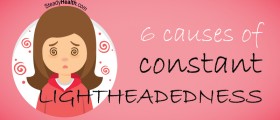
Dizziness occurs as a result of an impairment to or lack of supply of blood to the brain. Oxygen deficiencies in the blood can also lead to the onset of dizziness. Lightheadedness might occur as a result of orthostatic hypotension, hunger, common illnesses and infections, hypoglycemia, dehydration, heart problems or even anxiety or panic. Another related condition, vertigo, is normally caused by inflammation of the inner ear, inner ear disease, migraines and decreased blood flow to the brain.
Dizziness and lightheadedness can be indications of the onset of potentially life-threatening conditions like heart attack, shock or stroke. If you experience either of these conditions in addition to chest pain, speech or breathing difficulties, abdominal pain, headache, excess bleeding, weakness, numbness or changes in vision, you should seek medical attention as soon as possible.
Causes
Some of the causes of dizziness have already been documented here, including fatigue, hunger, hypoglycemia, hunger and anxiety. However, dizziness is also associated with other neurological conditions, such as multiple sclerosis, epilepsy, and Parkinson’s disease. With regard to vertigo, this condition is associated with difficulties in the vestibular system. This system is in charge of our body’s balance. Ear diseases and infections, like Meniere’s disease, can lead to interruptions in ones balance or gait. Benign positional vertigo creates an imbalance related to the inner ear, which occurs due to changing position of the head. Labyrinthitis occurs as a result of viral infection of the inner ear. This condition often occurs following a cold or flu. In addition to Meniere’s disease and labyrinthitis, the other possible causes of vertigo include alcohol or drug use, intoxication, and the potential side effects of medicinal administration.
Other causes of dizziness might be heart attack, shock or stroke. All of these conditions are serious and potentially life threatening. These problems will necessitate prompt medical care.
Complications
As indicated, dizziness might occur due to the presence of another underlying disease. As a result, not seeking proper treatment can result in major complications and even damage. In this case, it is important to promptly identify the underlying cause and look to address the problem as soon as possible. Try to work in conjunction with your doctor or a medical professional in order to do so. Some of the complications include brain damage, heart failure, hearing loss, vision loss, paralysis, and the spread of cancers and infections. If possible, do not neglect to seek medical advice in relation to the occurrence of dizziness.







_f_280x120.jpg)









Your thoughts on this
Loading...